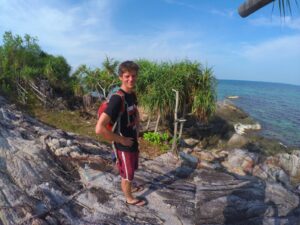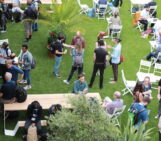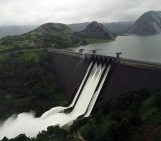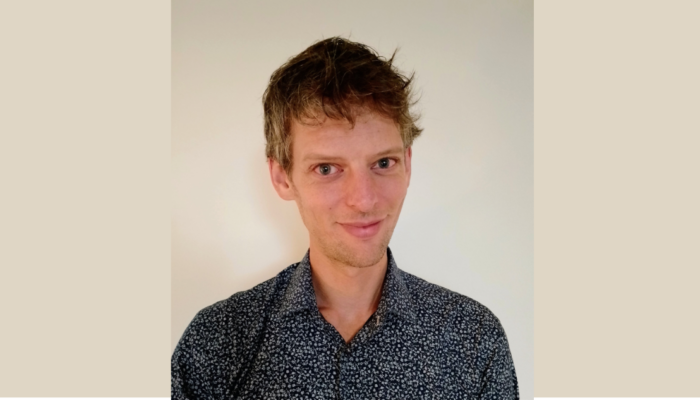
Hello Gino! Welcome to GeoTalk. Could you tell our readers a little bit about yourself and your background?
Sure thing! My background is mostly in tectonics, geomorphology and the evolution of (active) fault systems, which I developed during my studies at Utrecht University and my PhD at the IPGP (Paris). Initially I focused on the way that coastlines record either uplift or subsidence in response to active tectonics, but during a postdoc at ISTerre in Grenoble (France) I shifted focus a bit towards the way that coastlines record past sea-level changes. You can imagine these topics are closely linked: if you find a fossilized coastline at a certain elevation above the present-day coastline, it’s always the question whether the land used to be lower, or the sea-level used to be higher!
Two years ago I started a project that has me affiliated with both ISTerre and with the BRIN in Bandung (Indonesia). In this project I focus on the way that tectonics and sea-level changes have influenced, and will influence, the evolution of coral reefs and mangroves on the Indonesian coastlines. I use both field-based methods and numerical modelling in my research: the former is particularly useful for observations, measurements and data collection, and the latter to quantify the different processes involved.
The geologic time-scale is seemingly vast in comparison to the development of ecosystems. Could you tell us more about how tectonic changes shapes ecosystems like corals and mangroves?
Absolutely! If you’ve ever dived or snorkeled in tropical regions, you might have noticed that corals grow particularly well at depths of ~2 to 10 metres below the sea surface, and that mangroves grow in coastal areas where the ground is between the high- and low tide. Tectonic processes and (past) sea-level changes are key in shaping the coastal morphology of a given area, and thus to the space available for these ecosystems to grow.
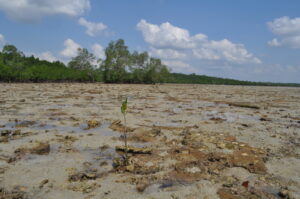
Example of a mangrove forest taking over a fossil coral reef that got uplifted out of the sea, at Belitung Island (Indonesia) (credit: Gino de Gelder)
To give an example, if tectonic processes moved up a coral reef platform from a few metres below sea-level to a metre above sea-level, corals will no longer be able to grow on that platform. On the other hand, if the tidal range is right, it might provide a fantastic substrate for mangroves to occupy (see picture and animation below). In a country like Indonesia with a lot of active fault systems there is an incredible variety of tectonic settings. Some of those tectonic settings have favoured the growth of coral reefs and/or mangroves over the past few (hundred) thousand years, whereas some tectonic settings may become more favourable when the sea-level is going to rise over the next century.
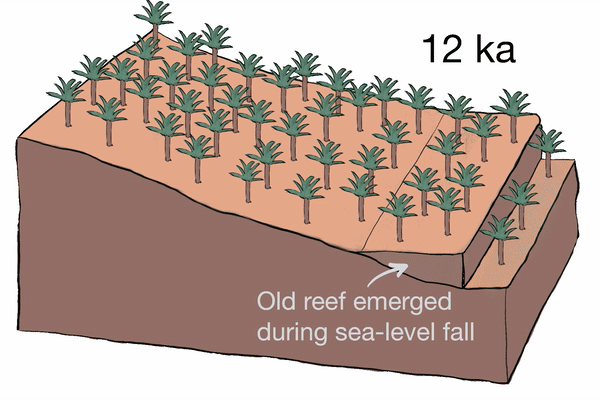
Schematic animation showing the sequence of events that could have led to the formation of a coastline such as in the picture above (credit: Dilruba Erkan)
Can understanding historic changes in tectonic settings help us better understand future sea-level rise?
Yes, they certainly can. Studying the geological evolution of coastlines is often a game of deciphering what is caused by tectonic processes, and what is caused by sea-level changes. To complicate things, neither tectonic processes nor sea-level changes are globally uniform. As such, predicting the effects of a melting ice-sheet or glacier on sea-level rise in a region like Indonesia, requires an understanding of the way the local landmasses and the sea have responded to increased melt water in the past. In Indonesia, pretty much every island is continuously moving up or down because of its complex tectonics, so to understand local sea-level history requires an understanding of that tectonic component.
What I’m trying to do in my research is not necessarily trying to quantify how much the sea-level will rise in the future, for which there are probably thousands of excellent scientists already doing a great job. Instead I am more concerned with the way that future sea-level rise will change coastal landscapes. If I’m walking around beautiful tropical islands here that are at most a metre above sea-level, I can’t help but wonder how much longer those islands will be existing. By looking into the past, and quantifying how fast coral reefs and mangroves have been growing, dying and eroding within different settings, my research will hopefully be useful in predicting future scenarios for these coastlines and contribute to their preservation.
You’re also the Early Career Scientist (ECS) Representative for the EGU Tectonics and Structural Geology (TS) Division. Part of your role involves organising events at the 2024 EGU General Assembly, both for the ECS community and for sessions dedicated to TS as a subject. Can you tell us what you’re up to at EGU24?
To be honest, much less than usual! I’m planning to remain in Indonesia until this summer, and to avoid flying around too much I’m going to skip the General Assembly in Vienna this year. Of course I am involved with TS Division activities from behind the scenes though.
This year there’s been a re-organization of the TS programme into different sub-themes, so hopefully people will find the new structure less complex, and more up-to-date with the current TS landscape. Our team of ECS will be taking care of some useful courses like Geology 101 and Tectonic Analogue Modelling 101, and several social and networking events throughout the week of the General Assembly. Keep an eye out on our Twitter and/or Blog page for that!
As part of the TS ECS team, could you tell us more about what you do and how people can get involved?
Sure! As ECS Representative, together with my co-representatives Sascha Zertani and Riccardo Lannari, I coordinate the TS team and make sure we inform and engage members within the TS community. The team consists of a media team, blog team and activities team.
The media team, led by Silvia Brizzi, enthusiastically puts out regular Tweets and Facebook posts about interesting studies, news and job openings within our field. The blog team, led by Hannah Davies, has been incredible in producing blog posts on a wide range of TS and ECS related topics. The activities team is taking care of other activities: at the moment we are towards the end of a series on 40 Must-Read papers, and we’re now discussing amongst ourselves what would be a fun new activity to engage the community.
We very much welcome anyone who would like to join us and help out in any of the teams with any sort of activity. Just get in touch through ecs-ts@egu.eu and we can probably sort something out!

